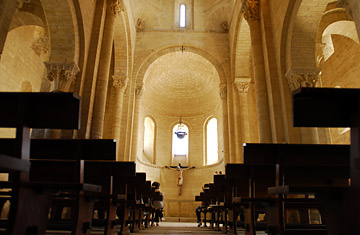
Any Sunday school kid knows that the best piece of Christian theology was written not by St. Augustine or Reinhold Niebuhr but by Dr. Seuss. How the Grinch Stole Christmas! — the story of how the Whos joyfully celebrate Jesus' birth even after a spiteful wretch robs all their holiday stuff — portrays faith more meaningfully than any church father or Yale philosopher ever did. Published for Christmas 1957, the book's obvious target was Yuletide commercialization. But its deeper message — don't confuse the accessories of religion with religion itself — seems especially relevant for Roman Catholics like me on Easter 2010.
This is the most uncomfortable Easter that Catholics have faced since the throes of the U.S. clerical sex abuse scandal in 2002. A new deluge of priest-pedophile stories, mostly in Europe, has cast another Good Friday pall over the resurrection celebration. This time some of the hierarchical cover-up may have even involved, if only indirectly, the man who would become the current Pope, Benedict XVI. And the Catholic Church's defensive response (as persecuted as the Jews?) has once again made it look like a dark fraternity in a Dan Brown novel instead of a luminous shepherd of souls, a self-interested corporation instead of the selfless ministry that Christ entrusted to St. Peter.
Little can alleviate the pain and suffering of the abuse victims. But at least in one sense, the Dr. Seuss sense, Catholics can use the Easter spirit of renewal to turn this heartbreak into something positive by putting their religion — their singular communion with Jesus' life and teachings — above their church. We're in this mess largely because we've continued to let the Catholic Church believe that it's somehow more important than the Catholic religion. And that's got to stop.
The Catholic Church is capable of tremendous good, as I was reminded recently while watching Catholic Relief Services work in Haiti. But a lot of Catholics feel like the Whos right now: the main symbol of our religion — the Church — has been stolen from us through its forfeiture of moral authority. The silver lining is that we're left to ponder our religion sans church, to define our faith not via hoary doctrine but via our own reason, which is how Catholicism is supposed to be practiced anyway. (Yes, despite the Vatican's warnings, it's safe to try theology at home!) Because Catholicism so richly contemplates Jesus' human as well as divine nature — Michelangelo didn't sculpt the Pieta in a theological vacuum — real Catholicism promotes human reason as a door to moral understanding and spiritual redemption. The Church can be a valuable guide to that understanding, one that jerks like me can benefit from. But it's not the arbiter of that understanding.
Especially not now. In fact, thanks to the ongoing scandal, more than a few friends and colleagues wonder why I haven't given up on Catholicism. I'll still be attending Easter Mass this weekend precisely because I follow Catholicism and not the Catholic Church — because Easter's redemptive message resides not in my church but in my religion. Not even our bishops, try as they have, can shame us away from the Eucharist and the human elevation we derive from it. Our church's disrepute, in fact, compels us to consider our religion's virtues more seriously. For starters, it might prod more Catholics to question, say, how Christian it is to heap Vatican-style condemnation on gays and lesbians and yet insist that pedophile priests need forgiveness more than prison time.
Like most Catholics, I appreciate Benedict's efforts to confront the abuse scourge. But Rome's moral fallibility (reminder: it didn't definitively disavow slavery until 1888) is particularly apparent when it tries to downplay the scandal by insisting that clergy in the 1960s and 70s were susceptible to the era's liberal mores, or that the rate of pedophilia among its ranks is no larger than that of society in general. Those arguments — We're no worse than the rest of you! — effectively surrender claims to moral superiority, let alone divine direction. As a Catholic, I believe in the workings of divine grace, that in the end light defeats darkness; but as a reasoning human being, I know that no mortal institution has direct access to it. If the Holy Spirit guides cardinals when they choose a Pope, where is it when bishops are moving ordained rapists from parish to parish?
I hate the fact that it takes a scandal like this to see the forest of religion from the trees of the church. But if Catholics are tired of their church embarrassing their religion, then they've got to quit indulging the priesthood's belief that its earthly power somehow matters as much as Jesus' teachings — one of the most important of which is that earthly power isn't what matters. Just as "packages, boxes or bags" didn't matter that much to the Whos. Dr. Seuss knew better. So should we.
